
Alphabetical Menu
Chronological Menu
|
On the Rocks 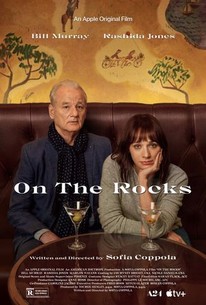 Laura (Rashida Jones) lives with her husband, Dean (Marlon Wayans), and two children in an upscale Manhattan apartment. When Dean returns from a work trip, she opens his suitcase and finds a woman's toiletry bag inside it. He claims that it belongs to his co-worker, Fiona (Jessica Henwick), who asked him to put it in his bag because it wouldn't fit in her bag, but Laura doesn't believe him. She suspects that he's having an affair with Fiona. When her father, Felix (Bill Murray), visits her, he persuades her to stalk Dean together to investigate whether or not he's having an affair. On the Rocks is a e screenplay by writer/director Sofia Coppola fails to acknowledge and explore the toxic relationship between Laura and her father. He's an unfaithful, uncouth and selfish man who sees women as objects and hasn't changed. During a lunch with his daughter at a fancy restaurant, it's clear that he has no concept of emotional boundaries and that he doesn't even notice how uncomfortable he's making Laura feel with his inappropriate conversation about women's breasts and other awkward topics that he shouldn't be discussing with his daughter. He's engaging in a form of emotional incest because of how icky he makes his daughter feel about during the conversation. That scene is neither funny nor even remotely amusing; it's tragic. Laura comes across as insecure, paranoid and unhappy, but those feelings most likely come from the toxic relationship with her father who cheated on her mother.
Why would she want to spend time with a parent who doesn't understand the concept of boundaries? Why does she put up with a self-absorbed parent (Jenny Slate) at her kids' school who constantly talks about herself over and over when Laura goes to pick up her kids? Laura clearly has no good friends to turn to for emotional support, including her workaholic husband, but, to be fair, she and him have communication problems in their troubled marriage. Are the problems systemic? Is their marriage worth salvaging? That remains unclear because Coppola skims over the early phase of their relationship, including their wedding, before throwing audiences right into the rocky part. On the Rocks seems less concerned about exploring the heart, mind and soul of its characters and instead tries to generate suspense with Laura's adventures with her dad. The more time they spend together, the more you realize just how hopeless toxic their relationship is and how he lacks accountability, remorse or anything that suggests a healthy father-daughter relationship. The revelations in the third act feel like a lazy and toothless cop-out that's equally contrived and rushed while leaving too many questions about Laura and Dean's marriage unanswered. On a positive note, the cinematography looks slick and stylish which makes the movie feel somewhat cinematic. Rashida Jones and Bill Murray give decent performances, but nothing that stands out because the screenplay doesn't provide enough of a window into their characters' heart, mind and soul. Coppola seems afraid to delve into the film's tragic, darker, profound elements and forgets to show any kind of believable character arc when it comes to any of the characters. What did Laura, Dean and Laura's father learn? How did they change? They haven't changed or learned much by the time the end credits roll. Compared to the far more honest, moving and profound marital drama 45 Years or the witty, warm and wise film Shirley Valentine, On the Rocks falls flat and disappoints. At a running time of 1 hour and 36 minutes, which feels more like 2 hours, On the Rocks is well-shot, but vapid, meandering, dishonest and cowardly. 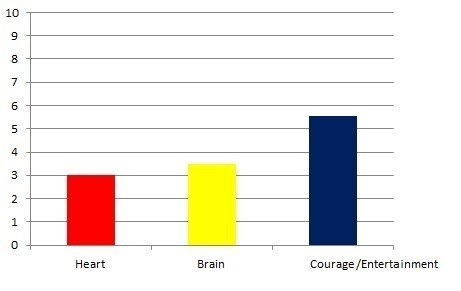 Radium Girls 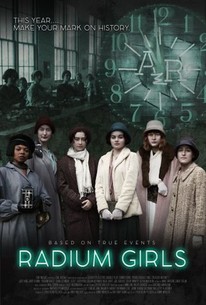 In the 1920s, Bessie (Joey King) and her sister, Jo (Abby Quinn), work at the American Radium Factory where they paint radium onto clock dials to make them glow. The factory workers, all women, are encouraged to lick their paintbrushes to make the paintbrush tips finer. When Jo gets sick, the company's doctor, Dr. Flint (Neal Huff), diagnoses her with syphillis even though she's a virgin and syphilis is a sexually-transmitted disease. Their older sister, Mary, had died of syphilis after working at the factory. Bessie didn't lick the radium on the paintbrushes, so she remains healthy while Jo becomes increasingly sick. Walt (Collin Kelly-Sordelet), a communist, introduces Bessie to Wiley Stephens (Cara Seymour), the founder of a consumer group. Wiley, in turn, introduces them to a lawyer who's willing to take their case to try to prove that radium is toxic and to hold the factory accountable for harming its workers. Not surprisingly, the company along with its doctors suppress info that radium is unsafe. The Radium Girls along with their lawyer rely on the testimony of a terminally ill company executive, Mr. Leech (Scott Shepherd), to help them win their lawsuit. Radium Girls tells a David vs. Goliath story that sounds like it could be compelling, heartfelt and suspenseful much like Silkwood and Erin Brockovich. The screenplay by co-director/writer Gunny Mohler and co-writer Brittany Shaw, based on a true story, doesn't flesh out its Jo and Bessie enough as characters to be as powerful as those films, but there are a few scenes that do indeed feel moving, i.e. the unflinching scenes of Jo suffering from radium poisoning. Some of the editing choices, although they're stylish, take away from the film's sense of realism that it's trying to achieve. At least the editing doesn't feel as choppy as the editing in the painfull dull and clunky Suffragettes Moreover, the filmmakers don't quite trust the audience's attention enough to let the scenes breathe because some of them have abrupt transitions to the next scene as though the film were in a hurry to tell the story. There are subplots that also feel more like filler such as Bessie's romance with Walt. A slower pace with more of the private moments with each of the Radium Girls would've helped to breathe much-needed life into the movie. That would've also made the trial scenes a lot more riveting and emotionally involving as the girls battle a greedy, corrupt company and their lawyers. There's also not enough use of comic relief that would've provided some levity. Fortunately, the performances by the talented members of the cast compensate for the screenplay's shortcomings. Although the screenplay feels pedestrian, the performances, especially by Joey King, Abby Quinn, Cara Seymour and Scott Shepherd, are all deeply moving. You can feel the familial love between Bessie and Jo. Also, the scenes that show Bessie getting angry and finding the courage to speak out as she discovers the injustices that American Radium Factory committed along with their cover-up are among the film's most powerful scenes thanks to Joey King's performance. It's refreshing to see a film with strong roles for women who find the innate strength to come together for an important cause. In that sense, Radium Girls is ultimately an empowering film for anyone who's ever felt wronged by a corrupt system. At a running time of 1 hour and 42 minutes, Radium Girls isn't as powerful or gripping as Silkwood, but it's a mildly engaging story enlivened by genuinely moving performances. 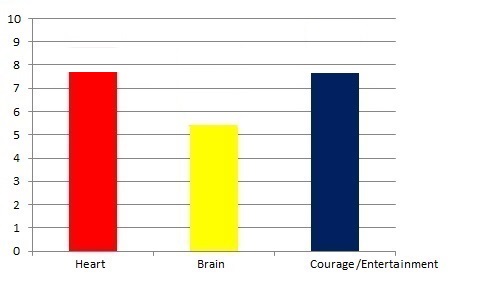 Rebecca 
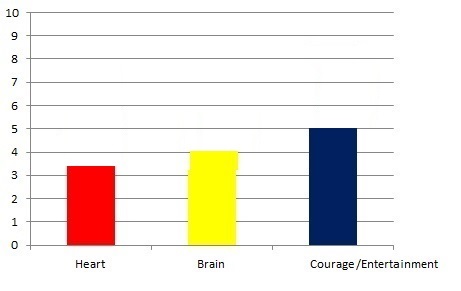 Synchronic 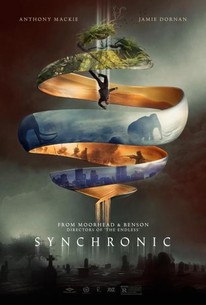 Steve (Anthony Mackie), a paramedic with a brain tumor, and his partner, Dennis (Jamie Dornan), discover a series of grisly murders that has something to do with a mysterious drug called Synchronic. When Brianna (Ally Ioannides), Dennis' teenage daughter, disappears after taking the drug, Steve desperately tries to find her and decides to risk taking Synchronic to do so. There's much more that happens during the intricate plot of Synchronic, but none of it will be spoiled here because the film does veer into a surprising direction that also changes its genre. The screenplay by writer/director Justin Benson is thoroughly gripping and even poignant at times. At first audiences might be confused about what's really going on, but the confusion dissipates once Dr. Kermani (Ramiz Monsef), inventor of Synthetic, tracks Steve down and explains to him how the drug works. To be fair, that scene with Dr. Kermani feels like slightly lazy exposition and could have been incorporated much more effectively and smoothly. It's the kind of scene you'd expect in a dumbed-down Hollywood film that needs to hold its audience by the hand and spoon-feed them. There's nothing wrong with being a little confused and for trying to connect the dots on one's own. If only the filmmakers had trusted the audience's intelligence more during that key scene. Synchronic still remains suspenseful, though, because you root for Steve to succeed in finding Brianna. The scene when Dennis learns about the drug and how it could help him to find Brianna is quite touching. It's also interesting that the filmmakers decided to omit the moment when Steve explains the drug to Dennis; instead, they imply that he just explained it to him and therefore trust the audience's imagination. Fortunately, writer/director Justin Benson and co-director Aaron Moorhead don't bombard the film with action and visual effects. They weave the CGI sequences with a compelling story that remains grounded with the well-written character of Steve. He's a decent person with a good heart and he's also a great friend to Dennis. Most importantly, though, he's a critical thinker, and it's fascinating to watch him figure out how to use the rules of Synchronic to find Brianna. Anthony Mackie gives a tender and well-nuanced performance to boot, so Synchronic is very fortunate to have such an underrated, naturally talented actor as the lead because he carries the emotional burdens of his role very effectively without overacting. With a lean running time of 1 hour and 36 minutes, Synchronic is a suspenseful, cerebral and surprisingly poignant journey. 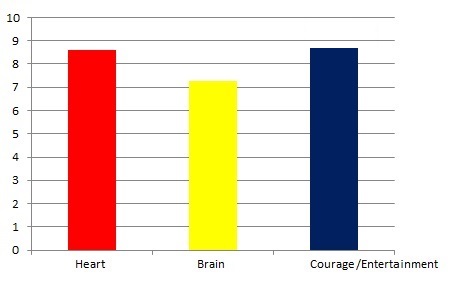 |